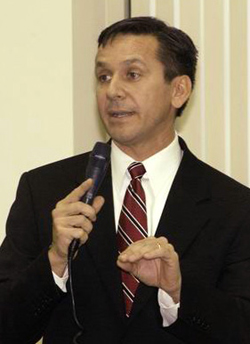Despite the fact that former state Sen. Dino Rossi is virtually unopposed for the Republican nomination for governor, he has scheduled nearly $1 million worth of television advertising to run before the Sept. 14 primary election. It is just one more sign that this year’s battle for the mansion in Olympia will break records for gubernatorial electioneering. The Rossi campaign passed the $3 million fund-raising mark last week, boosted in part by an event hosted by Vice President Dick Cheney in Kennewick.
Rossi’s $936,622 advertising buy spans the state and will be seen on TV stations in Seattle, Spokane, and Yakima. Rossi has purchased ads during programs that have a large female audience, such as daytime soap operas and Live With Regis and Kelly, as well as programming watched by mostly men, like Seattle Mariners baseball games and Seattle Seahawks preseason matches. “We are going to be introducing Dino to the voters,” says Rossi’s spokesperson, Mary Lane.
Democratic political consultant Cathy Allen of Campaign Connections says, “I’m in cardiac arrest here.” Allen bets this is the most money ever spent on TV ads in a Washington primary.
So why is Rossi spending so heavily before the primary if he has no viable Republican opponent? There are a couple of reasons: a small practical one and a huge political one.
Summing up Rossi’s practical challenge, Democratic political consultant Michael Grossman of Fifty Plus One says, “He’s worried about availability.” The airwaves in Washington state, especially if the presidential race tightens here, are expected to be so congested with political advertising this fall that buying prime time, even if you have the money, might become difficult.
The more important reason, however, is also Rossi’s biggest current challenge: Very few voters have ever even heard of him. Rossi is a little known state senator from Sammamish who served less than two terms, much of that as a member of a minority party. His most prominent role was during the 2002 session, when as chair of the Ways and Means Committee he helped craft a bipartisan, no-new-taxes budget that closed a $2.6 billion deficit. Both of the leading Democratic gubernatorial candidates, two-term state Attorney General Christine Gregoire and two-term King County Executive Ron Sims, are much better known to voters across the state.
Rossi has a great opportunity to define himself, since he has such a low public profile. While his campaign says no ads are currently available for preview, Rossi’s campaign strategy has been clear and consistent from the start: Run to the middle. “Dino Rossi is a different kind of Republican,” says spokesperson Lane. “He is a fiscal conservative with a social conscience.” Over the past couple of years, and on the campaign trail, Rossi has stressed how his 2002 state budget avoided new taxes (fiscal conservatism) and took care of the truly needy (social conscience).
It all depends on how you define those who deserve government help, however. Rossi did restore cuts to programs for the disabled and nursing homes, cuts that Gov. Gary Locke had proposed in his no-new-taxes budget. Rossi’s budget, however, also wanted to toss 40,000 low-income kids off health insurance—as Christine Gregoire’s campaign is forever reminding us.
Gregoire is racing to define Rossi as a candidate so conservative that he is far to the right of the vast majority of Washington’s voters. Gregoire spokesperson Morton Brilliant says, “Dino Rossi has one big problem: His record is out of step with Washington’s values.” The Gregoire campaign cites, as evidence of his conservatism, Rossi’s opposition to abortion and his votes to suspend education initiatives that lowered class size and gave annual raises to teachers. The Democrats have launched a Web site that compares Rossi’s positions to those of former GOP gubernatorial candidates Ellen Craswell and John Carlson, who lost badly in the general elections of 1996 and 2000, respectively.
Rossi’s campaign says the public is sick of all this negative politicking. “It’s the same old attack, attack, attack—the politics of personal destruction,” says Rossi’s spokesperson, Lane. “When people see Dino Rossi, they like him.” The Rossi campaign is trying to get people to focus on the moderate personality of their candidate—a kinder, gentler style of Republican. It’s straight out of George W. Bush’s 2000 playbook.
Of course, as W has shown, it’s possible to be both personally charming and a radically conservative executive. Rossi is a very conservative Republican, not just on social issues but also on economic issues. His agenda is to bring back the Reagan revolution and deregulate Washington state. He is hostile to organized labor—one union held a rally where they sang “Dino Rossi, Dino Rossi, cheap and mean” to the tune of “Frere Jacques” during the 2002 budgeting process. He is not only antichoice, he supported antiñaffirmative action Initiative 200. In 2003, Rossi got a 100 percent rating from the Washington Conservative Union (www.washcon.org). His ads won’t change these facts, but they will distract voters from focusing on them.








